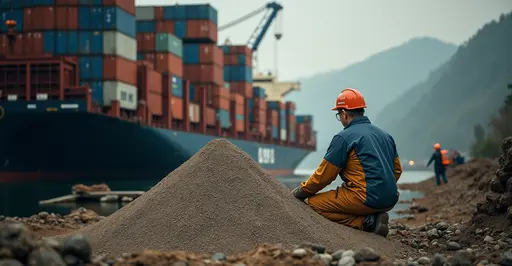
The Rare Earth Power Play
China is significantly increasing rare earth mineral exports to European nations, reshaping global tech supply chains. This strategic shift comes amid ongoing trade tensions with the United States and follows China's April 2025 export restrictions that disrupted manufacturing worldwide. Rare earth elements - 17 metals crucial for electronics, electric vehicles, and defense systems - remain central to geopolitical resource competition.
Why Rare Earths Matter
These minerals power everything from smartphones to wind turbines. A single iPhone contains up to 50 rare earth metals. China controls 90% of global processing capacity, giving it enormous leverage in tech supply chains. The EU imports 98% of its rare earth magnets from China, making Europe particularly vulnerable to supply disruptions.
Trade War Fallout
After imposing export controls in April during peak US-China trade tensions, China approved only 25% of rare earth export applications to Western nations. This caused production delays at major automakers like Volkswagen and industrial warnings of "factory shutdowns." Shipments to Germany plunged 50% and US imports dropped 60% immediately after restrictions took effect.
Europe's Supply Chain Crisis
European Commission trade chief Maroš Šefčovič urgently appealed to Chinese Commerce Minister Wang Wentao in June 2025, calling the situation "alarming." The European Association of Automotive Suppliers warned the restrictions were "already shutting down production in Europe's supplier sector." Manufacturers reported paying 4-10 times normal prices for remaining stockpiles.
The EU's Counterstrategy
Europe is fighting back through its Critical Raw Materials Act and 2025 Strategic Materials Plan:
Securing Alternative Supplies
The EU identified 34 critical raw materials and selected 47 strategic projects to diversify sources. Initiatives include deep-sea mining partnerships with Norway and recycling innovation hubs in Finland. "We must reduce dependency on single suppliers," stated EU Internal Market Commissioner Thierry Breton.
Accelerating Recycling
New regulations mandate 25% recycled content in permanent magnets by 2030. The European Raw Materials Alliance is funding 14 pilot plants to recover rare earths from electronic waste, aiming to meet 20% of EU demand through recycling by 2035.
Global Implications
China's export ramp-up to Europe signals a strategic pivot amid ongoing US tensions. While benefiting European manufacturers short-term, experts warn this creates new dependencies. "The dragon is taming the tiger through resource diplomacy," observed Geneva Trade Institute analyst Marie Dubois. As green tech demands surge - rare earth needs for EVs will triple by 2030 - this resource chess game will determine tomorrow's industrial leaders.

 Nederlands
Nederlands
 English
English
 French
French
 Deutsch
Deutsch
 Espaniol
Espaniol
 Portugese
Portugese



